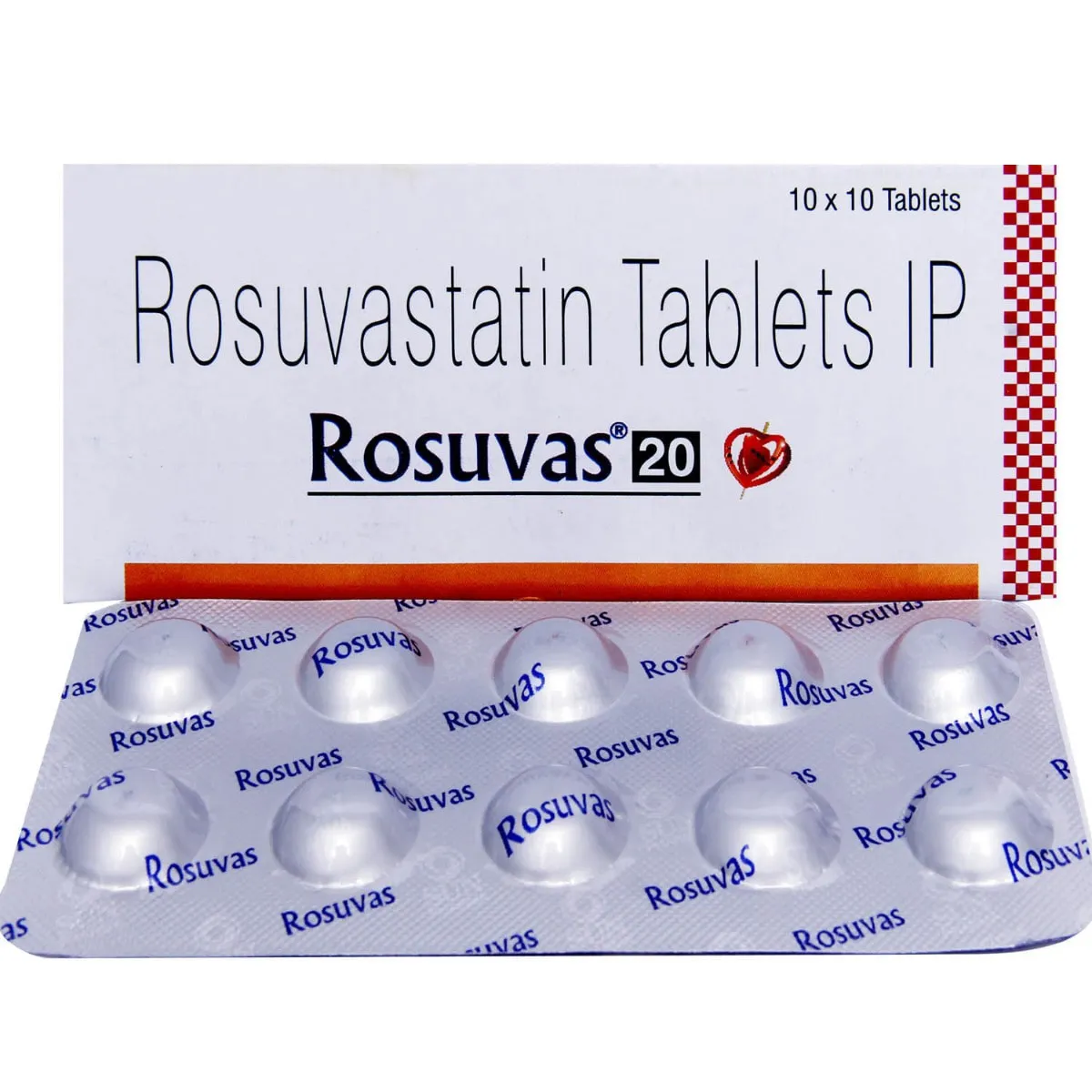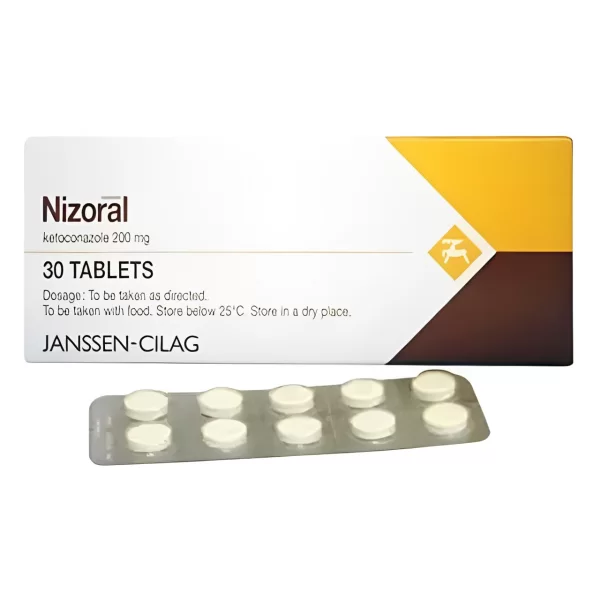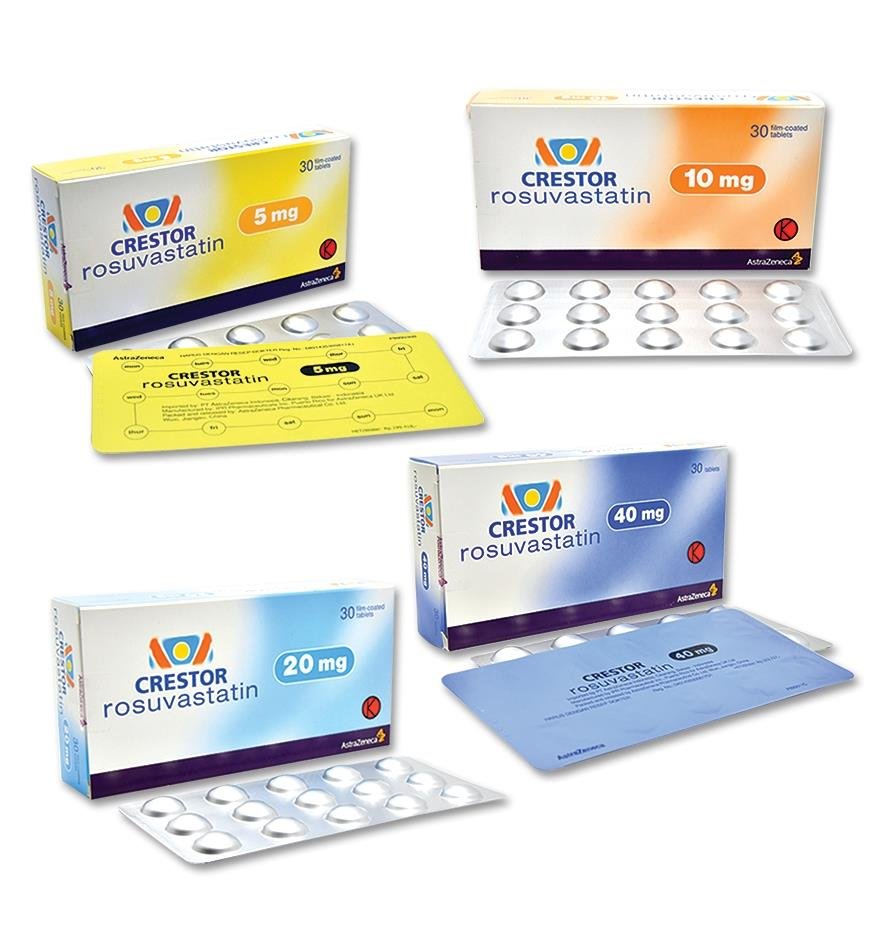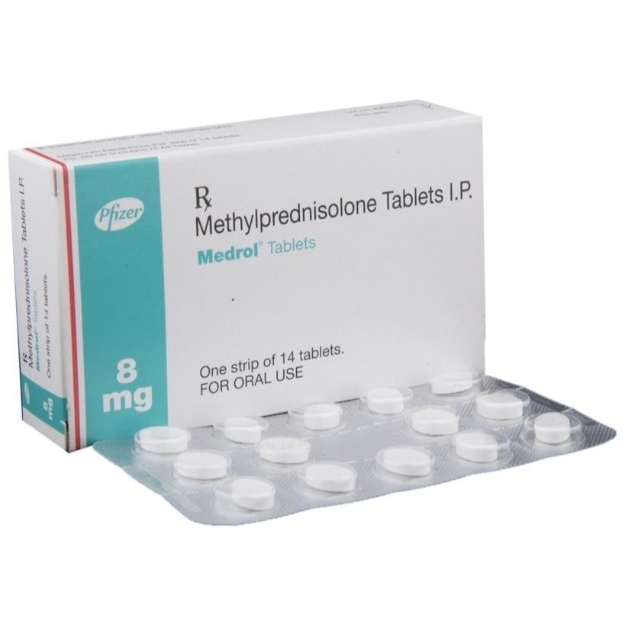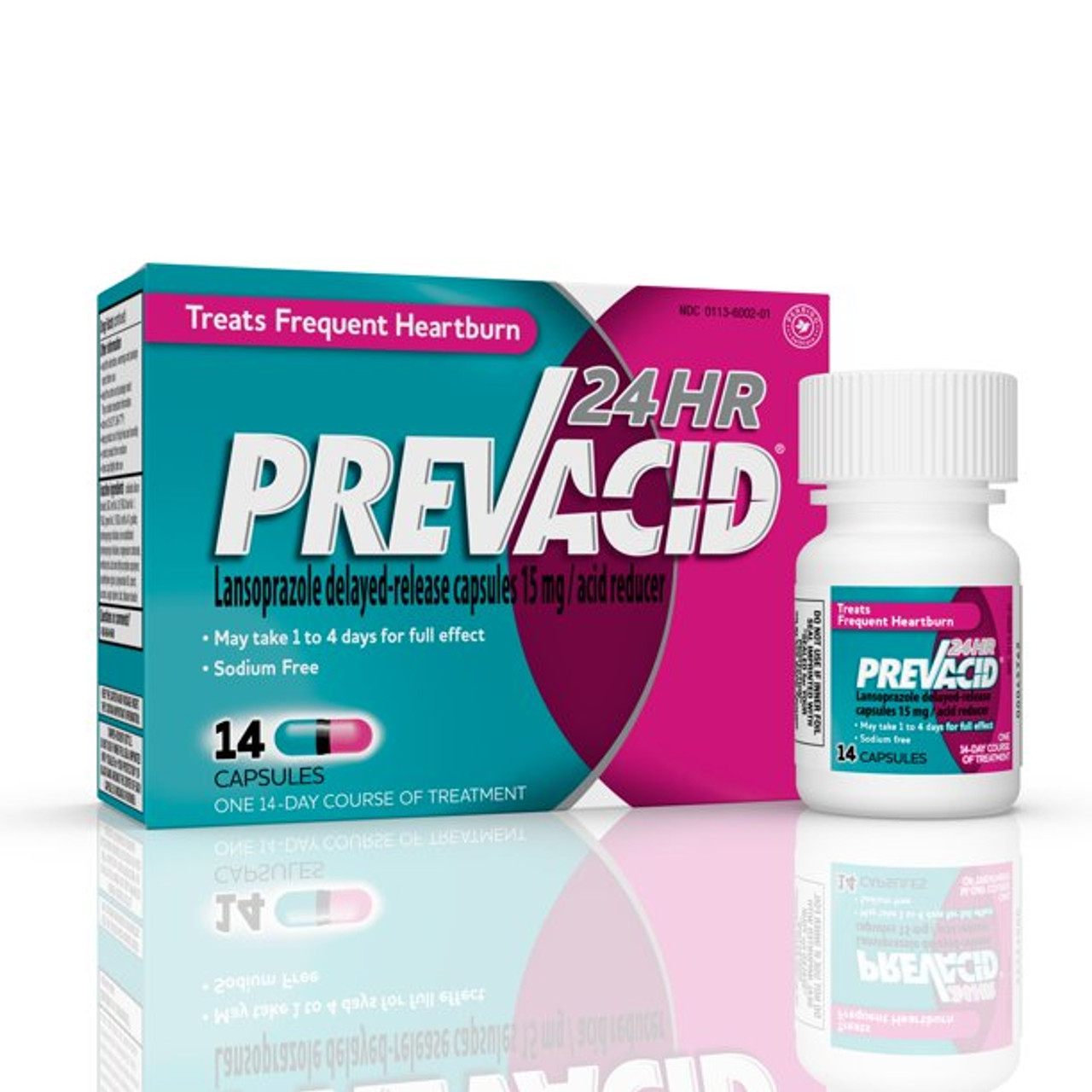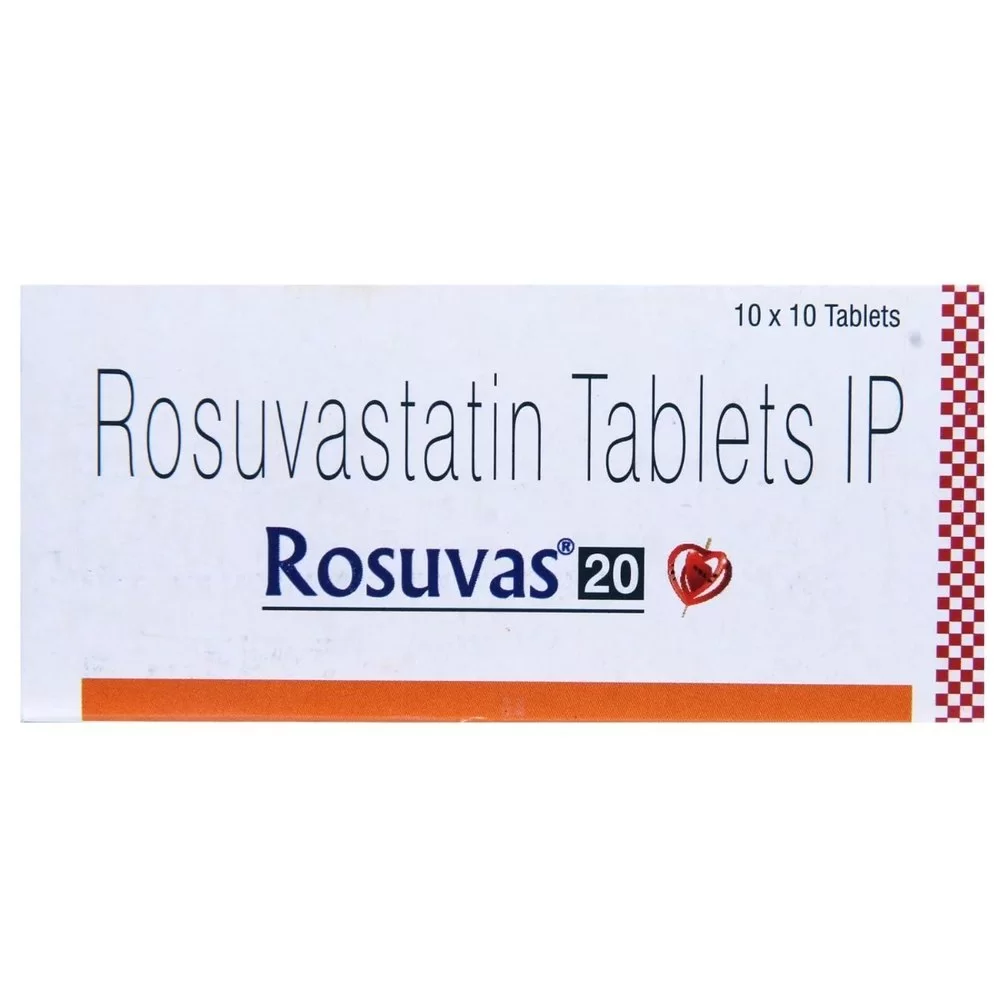
Rosuvastatin
Rosuvastatin - 10mg
| Product | Per Pill | Savings | Per Pack | Order |
|---|---|---|---|---|
| 30 pills | $2.22 | $66.58 | Buy Now | |
| 60 pills | $1.79 | $25.47 | $133.16 $107.69 | Buy Now |
| 90 pills | $1.65 | $50.93 | $199.73 $148.80 | Buy Now |
| 120 pills | $1.58 | $76.40 | $266.31 $189.91 | Buy Now |
| 180 pills | $1.51 | $127.33 | $399.46 $272.13 | Buy Now |
| 270 pills | $1.46 | $203.72 | $599.18 $395.46 | Buy Now |
Overview of Rosuvastatin
General Introduction to Rosuvastatin
- Rosuvastatin, commonly known by its brand name Crestor, is a statin medication used to treat high cholesterol and prevent cardiovascular disease. It works by inhibiting HMG-CoA reductase, an enzyme involved in the production of cholesterol in the liver. Rosuvastatin is available in tablet form.
Key Benefits and Unique Properties of Rosuvastatin
- Effective Cholesterol Reduction: Rosuvastatin significantly lowers low-density lipoprotein (LDL) cholesterol and total cholesterol levels, reducing the risk of heart disease and stroke.
- High Potency: Among the statins, rosuvastatin is one of the most potent, providing effective lipid control even at lower doses.
- Cardiovascular Risk Reduction: Reduces the risk of cardiovascular events such as heart attacks and strokes, especially in patients with established heart disease or risk factors.
- Favorable Impact on Triglycerides: Besides lowering LDL cholesterol, rosuvastatin also helps reduce triglycerides and slightly increases high-density lipoprotein (HDL) cholesterol.
- Long Half-Life: Has a longer half-life compared to other statins, allowing for flexible dosing schedules.
- Safety Profile: Generally well-tolerated with a low incidence of severe side effects when used as directed.
- Anti-Inflammatory Properties: May exert additional cardiovascular benefits through anti-inflammatory effects on the arterial walls.
Effectiveness of Rosuvastatin
- Clinical studies have shown that rosuvastatin effectively lowers LDL cholesterol by up to 55% and total cholesterol by up to 40%. It also reduces triglycerides by up to 20% and modestly increases HDL cholesterol. These effects contribute to a significant reduction in cardiovascular events, including heart attacks and strokes.
Safety and Tolerability of Rosuvastatin
- Rosuvastatin is generally well-tolerated. Common side effects include muscle pain, weakness, abdominal pain, nausea, and headache. Rare but serious side effects include rhabdomyolysis and liver dysfunction. Regular monitoring and adherence to prescribed dosages help minimize risks.
Indications for Use of Rosuvastatin
Diseases and Conditions Treated by Rosuvastatin
- Rosuvastatin is indicated for the treatment of hypercholesterolemia (high cholesterol), mixed dyslipidemia, and hypertriglyceridemia. It is also used to prevent cardiovascular events in patients with established heart disease or high-risk profiles.
Primary Symptoms and Indications for Rosuvastatin
- Hypercholesterolemia: Lowers LDL cholesterol and total cholesterol in patients with high cholesterol levels.
- Mixed Dyslipidemia: Manages abnormal lipid levels, including elevated triglycerides and low HDL cholesterol.
- Cardiovascular Prevention: Reduces the risk of heart attacks, strokes, and other cardiovascular events in high-risk patients.
Dosage and Administration of Rosuvastatin
Recommended Dosage of Rosuvastatin
- The typical starting dose for adults is 10-20 mg once daily. For patients with severe hypercholesterolemia or those requiring aggressive lipid reduction, the starting dose may be increased to 40 mg once daily. Dosage adjustments should be based on individual patient response and tolerance.
Timing and Frequency of Rosuvastatin Administration
- Once Daily: Rosuvastatin should be taken once daily, with or without food. It is typically taken at the same time each day to maintain consistent blood levels.
- Adjustments: Dosage adjustments should be made at intervals of at least 4 weeks, based on lipid levels and patient response.
Additional Recommendations for Rosuvastatin Use
- Proper Use: Follow the prescribed dosing instructions provided by a healthcare professional. Do not crush or chew the tablets; swallow them whole with water.
- Missed Dose: If a dose is missed, take it as soon as remembered unless it is almost time for the next dose. Do not double the dose to make up for the missed one.
Mechanism of Action of Rosuvastatin
Description of Rosuvastatin Mechanism
- Rosuvastatin works by inhibiting HMG-CoA reductase, an enzyme crucial for the synthesis of cholesterol in the liver. By blocking this enzyme, rosuvastatin reduces the production of cholesterol, leading to a decrease in LDL cholesterol levels in the blood.
Biochemical Processes Involving Rosuvastatin
- Cholesterol Synthesis Inhibition: Inhibits HMG-CoA reductase, reducing the synthesis of cholesterol in the liver.
- LDL Receptor Upregulation: Increases the number of LDL receptors on liver cells, enhancing the clearance of LDL cholesterol from the bloodstream.
Physiological Effects of Rosuvastatin
- Lipid Reduction: Significantly lowers LDL cholesterol, total cholesterol, and triglycerides, while modestly increasing HDL cholesterol.
- Cardiovascular Protection: Reduces the risk of cardiovascular events by improving lipid profiles and exerting anti-inflammatory effects.
Composition of Rosuvastatin
Active Ingredients in Rosuvastatin
- The active ingredient in rosuvastatin is rosuvastatin calcium, a statin that inhibits cholesterol synthesis.
Inactive Ingredients in Rosuvastatin
- Inactive ingredients may include lactose monohydrate, microcrystalline cellulose, calcium phosphate, crospovidone, magnesium stearate, and Opadry pink. These ingredients help stabilize the formulation and ensure proper delivery of the medication.
Side Effects of Rosuvastatin
General Introduction
- Understanding potential side effects helps ensure the safe use of rosuvastatin. Patients should be aware of common and serious side effects to monitor their health effectively while on the medication.
Possible Side Effects of Rosuvastatin
- Common Side Effects: Muscle pain, weakness, abdominal pain, nausea, headache, and constipation. These side effects are usually mild and transient.
- Less Common Side Effects: Some patients may experience rash, itching, and dizziness.
- Serious Side Effects: Rare but serious side effects include rhabdomyolysis (severe muscle breakdown), liver dysfunction, and allergic reactions. Immediate medical attention is required if any serious side effects occur.
Frequency and Severity of Rosuvastatin Side Effects
- Common side effects are generally mild and do not significantly interfere with daily activities. Severe side effects are rare but can be serious, necessitating immediate medical intervention. Regular follow-ups and patient education on correct usage can minimize risks.
Prevention of Side Effects of Rosuvastatin
General Introduction
- Preventing side effects is key to maximizing the therapeutic benefits of rosuvastatin. By following preventive measures, patients can reduce the likelihood of experiencing adverse reactions.
Tips for Preventing Rosuvastatin Side Effects
- Proper Technique: Use rosuvastatin as directed, following the instructions for proper administration.
- Regular Monitoring: Regular check-ups with healthcare providers can help detect and manage potential side effects early.
- Healthy Practices: Maintain a healthy diet and exercise routine to enhance the effectiveness of rosuvastatin.
- Consult Healthcare Providers: Inform your healthcare provider about any other medications or supplements to avoid potential interactions.
Contraindications for Rosuvastatin
General Introduction
- Understanding contraindications ensures the safe use of rosuvastatin. Certain conditions and diseases may preclude the use of this medication.
Conditions and Diseases Contraindicating Rosuvastatin
- Hypersensitivity: Patients with a known hypersensitivity to rosuvastatin or any of its components should not use this medication. Allergic reactions can include symptoms such as rash, itching, swelling, and difficulty breathing.
- Liver Disease: Rosuvastatin is contraindicated in patients with active liver disease or unexplained persistent elevations of liver enzymes.
- Pregnancy and Breastfeeding: Rosuvastatin is contraindicated during pregnancy and breastfeeding due to potential risks to the fetus and infant.
Warnings/Precautions for Rosuvastatin
General Introduction
- Following precautions is essential to ensure the safe and effective use of rosuvastatin. Patients should be informed about potential risks and how to mitigate them.
Important Warnings for Rosuvastatin
- Muscle Pain and Weakness: Rosuvastatin can cause muscle pain and weakness. Patients should report any unexplained muscle symptoms to their healthcare provider.
- Liver Function: Regular monitoring of liver function is recommended due to the risk of liver enzyme elevations and liver dysfunction.
- Alcohol and Statins: Limit alcohol intake while taking rosuvastatin to reduce the risk of liver damage.
Precautions for Rosuvastatin Use
- Regular Monitoring: Regular check-ups with healthcare providers are essential to monitor for potential side effects and ensure effective treatment.
- Patient Education: Patients should be educated on the proper use of rosuvastatin, recognizing signs of serious side effects, and when to seek medical help.
Missed Dose of Rosuvastatin
General Introduction
- Proper management of missed doses helps maintain effective symptom control. Patients should be aware of how to handle missed doses to avoid disruptions in their treatment regimen.
What to Do If a Dose of Rosuvastatin is Missed
- If a dose is missed, take it as soon as remembered unless it is almost time for the next dose. In such cases, the missed dose should be skipped, and the patient should continue with the regular dosing schedule. It is important not to double the dose to make up for the missed one.
Tips for Adherence to Rosuvastatin
- Reminders: Use alarms or medication organizers to help remember to take rosuvastatin as prescribed.
- Routine: Take the medication at the same time each day to develop a routine and reduce the chances of missing a dose.
Drug Interaction with Rosuvastatin
General Introduction
- Understanding potential drug interactions helps in avoiding adverse effects and ensuring the effectiveness of rosuvastatin. Patients should be aware of common interactions and how to manage them.
Examples of Interactions with Rosuvastatin
- Antacids: Concurrent use with antacids containing aluminum or magnesium hydroxide can reduce the absorption of rosuvastatin.
- Blood Thinners: Combining rosuvastatin with blood thinners such as warfarin can increase the risk of bleeding.
- Other Statins and Fibrates: Using multiple lipid-lowering agents can increase the risk of muscle-related side effects.
How to Avoid Negative Interactions with Rosuvastatin
- Medication Review: Regularly review all medications with healthcare providers to identify and manage potential interactions before they cause adverse effects.
- Inform Healthcare Providers: Always inform healthcare providers of all medications being taken, including over-the-counter drugs and supplements, to ensure safe and effective use of rosuvastatin.
Overdose of Rosuvastatin
Symptoms of Rosuvastatin Overdose
- Overdosing on rosuvastatin can lead to symptoms such as extreme muscle pain, weakness, confusion, memory problems, and liver damage. In severe cases, overdose can cause kidney failure and rhabdomyolysis.
Actions to Take in Case of Rosuvastatin Overdose
- Immediate Measures: Seek emergency medical attention or call a poison control center immediately if an overdose is suspected. It is important to provide healthcare professionals with information about the amount of medication taken and the time of ingestion.
- First Aid: While waiting for medical help, provide supportive care to the affected individual. This includes maintaining an open airway, monitoring vital signs, and keeping the person comfortable. Do not induce vomiting unless instructed by a healthcare professional.
Pharmacokinetics of Rosuvastatin
Absorption of Rosuvastatin
- Rosuvastatin is well-absorbed from the gastrointestinal tract, with peak plasma concentrations typically occurring within 3 to 5 hours after administration.
Distribution of Rosuvastatin
- Once absorbed, rosuvastatin is widely distributed throughout the body. It has a high affinity for liver cells, where it exerts its cholesterol-lowering effects.
Metabolism of Rosuvastatin
- Rosuvastatin undergoes limited metabolism, primarily through the liver. It is metabolized by cytochrome P450 2C9 (CYP2C9) enzymes, with minimal involvement of CYP3A4 enzymes.
Elimination of Rosuvastatin
- The metabolites of rosuvastatin are excreted primarily via the feces. The elimination half-life of rosuvastatin is approximately 19 hours, allowing for once-daily dosing.
Dosage Forms of Rosuvastatin
Available Dosage Forms of Rosuvastatin
- Rosuvastatin is available in tablet form, with common dosages including 5 mg, 10 mg, 20 mg, and 40 mg. These varying strengths allow for flexible dosing according to patient needs and response.
Advantages of Rosuvastatin Dosage Forms
- Tablet: Provides precise dosing and is easy to swallow. The range of available strengths allows for individualized treatment plans tailored to each patient's lipid-lowering needs.
Pregnancy and Breastfeeding with Rosuvastatin
Safety of Rosuvastatin Use During Pregnancy and Breastfeeding
- The safety of rosuvastatin during pregnancy and breastfeeding has not been fully established. Animal studies have shown adverse effects on fetal development, and there are no adequate and well-controlled studies in pregnant women. Rosuvastatin should not be used during pregnancy. Rosuvastatin is excreted in human milk, and due to the potential for serious adverse reactions in nursing infants, breastfeeding is not recommended while taking this medication.
Recommendations for Pregnant and Nursing Mothers Using Rosuvastatin
- Pregnancy: Avoid use during pregnancy. If a woman becomes pregnant while taking rosuvastatin, the medication should be discontinued immediately, and the healthcare provider should be informed.
- Breastfeeding: Nursing mothers should consult their healthcare provider to weigh the benefits and risks of using rosuvastatin while breastfeeding. Regular monitoring of the infant for any adverse effects is recommended if the mother continues to use the medication.
- Consultation: Pregnant and nursing mothers should have regular consultations with their healthcare provider to monitor their condition and the health of their baby. Adjustments to the treatment plan may be necessary based on the mother’s and baby’s health status.
Storage Conditions for Rosuvastatin
Recommended Storage Conditions for Rosuvastatin
- Rosuvastatin should be stored at room temperature between 20°C to 25°C (68°F to 77°F). The medication should be kept in its original container, tightly closed, and out of reach of children. Protecting the medication from light and moisture helps maintain its stability and effectiveness.
Temperature and Other Conditions for Rosuvastatin Storage
- Temperature: Avoid storing rosuvastatin in extreme temperatures (above 30°C or below 15°C). High temperatures can degrade the active ingredient, while low temperatures can affect the tablet's integrity.
- Moisture Protection: Keep the medication away from high humidity environments such as bathrooms. Exposure to moisture can cause the tablets to become less effective.
- Shelf Life: Check the expiration date on the packaging and do not use the medication past this date. Proper adherence to storage guidelines ensures the medication remains effective throughout its shelf life. If the medication shows any signs of deterioration, such as changes in color or consistency, it should be discarded.
Clinical Trials and Efficacy of Rosuvastatin
Overview of Rosuvastatin Clinical Trials
- Rosuvastatin has been evaluated in numerous clinical trials to assess its efficacy and safety in treating hypercholesterolemia and preventing cardiovascular events. These studies typically involve large patient populations with various demographics and conditions. The trials are designed to measure improvements in lipid levels and reduction in cardiovascular events.
Key Findings and Conclusions of Rosuvastatin Studies
- Efficacy: Clinical trials consistently show that rosuvastatin significantly lowers LDL cholesterol, total cholesterol, and triglycerides, while modestly increasing HDL cholesterol. These findings highlight the medication’s effectiveness in improving lipid profiles and reducing cardiovascular risk.
- Safety: The safety profile of rosuvastatin is well-documented, with a low incidence of severe side effects when used as directed. Long-term studies confirm its tolerability and continued effectiveness over extended periods. Patients generally experience minimal side effects, making it a reliable and safe treatment option for managing hypercholesterolemia and preventing cardiovascular events.
- Comparison: Rosuvastatin’s efficacy is superior to many other statins, providing effective lipid control at lower doses. It offers an effective alternative or adjunctive therapy for patients who need comprehensive management of their lipid levels and cardiovascular risk.
Conclusion
Overview of Key Aspects
- Rosuvastatin is a potent and well-tolerated statin for managing hypercholesterolemia and preventing cardiovascular events. Its mechanism of action involves inhibiting HMG-CoA reductase, leading to significant reductions in LDL cholesterol and total cholesterol. Clinical trials have demonstrated its ability to provide significant lipid-lowering effects and reduce the risk of cardiovascular events. The medication is available in various tablet strengths, making it convenient and easy to use.
Key Advantages and General Recommendations
- Key Advantages:
- Effective Cholesterol Reduction: Significantly lowers LDL cholesterol and total cholesterol levels.
- Cardiovascular Risk Reduction: Reduces the risk of heart attacks, strokes, and other cardiovascular events.
- Favorable Impact on Triglycerides: Lowers triglycerides and modestly increases HDL cholesterol.
- High Potency: Provides effective lipid control even at lower doses.
- Long Half-Life: Allows for flexible dosing schedules.
- Safety Profile: Generally well-tolerated with a low incidence of severe side effects.
- General Recommendations:
- Dosages: Follow the prescribed dosages for hypercholesterolemia and cardiovascular prevention.
- Precautions: Regular monitoring for potential side effects and proper administration technique.
- Therapy Enhancement: Maintain a healthy diet and exercise routine to enhance the effectiveness of rosuvastatin.
- Key Advantages:
